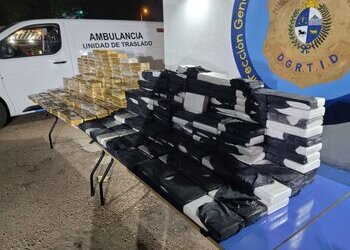With drug seizures coming thick and fast, Uruguay is having to rapidly reassess its position in the global drug trade. But before coming up with the right solutions, authorities need to be asking the right questions.
The list of seizures of drug shipments inside Uruguay, heading for the country, or having departed from it, is exhaustive. An Argentine gang was caught bringing 85 kilograms of cocaine paste, according to a September 12 government press release, while a truck carrying 30 more kilograms of cocaine was caught trying to enter from Argentina on September 7.
Authorities in Paraguay seized a small plane carrying around 400 kilograms of cocaine presumably bound for Uruguay on September 5. In July, five tons of cocaine were found at the Belgian port of Antwerp on a ship which had passed through Paraguay and Uruguay.
SEE ALSO: Coverage of Uruguay
The pace and frequency of drug seizures into Uruguay has been accelerating since the COVID-19 pandemic and will continue to do so, according to one expert who spoke to InSight Crime, especially due to neighboring countries increasing vigilance. “For example, during the pandemic, the Port of Santos in Brazil was tightly controlled. The movement [of drugs] there dropped significantly and local authorities were more alert. They opted for alternative routes,” explained Nicolas Centurión, a Uruguay crime observer and analyst at the Latin American Center for Strategic Analysis (Centro Latinoamericano de Análisis Estratégico – CLAE).
The government has readily accepted there is a problem with Uruguay’s ability to contain this transborder drug trafficking. “Foreign traffickers take advantage of the porosity of the borders Uruguay shares with Argentina and Brazil. And they use Montevideo as a base of operations for drug trafficking and logistics,” said Diego Sanjurjo, coordinator of focused police anti-crime strategies at the Uruguay Ministry of the Interior, during an interview with InSight Crime in June 2022.
However, beyond that, the government has not presented any concrete plans. Instead, Uruguay’s media and politics have been focused on the saga of Sebastián Marset, the country’s best-known drug trafficker.
But the debate is not around his drug trafficking activities or on unraveling his network. Instead, an investigation is seeking to find out whether Marset obtained support from within the government in getting a new passport sent to him, which helped him secure his release after being arrested in the United Arab Emirates.
Marset is currently on the run and may be hiding in Mozambique, according to recent Uruguayan media reports.
InSight Crime Analysis
The volume of drugs passing through Uruguay pales in comparison to some of its neighbors. This does not mean that the country can afford to ignore how to best fight drug-trafficking at that scale.
First, an important aspect is how Uruguayan authorities can best collaborate with regional allies and anti-drug institutions to gather information. For Centurión, such collaboration has been lackluster. “Coordination with other countries and the US Drug Enforcement Administration (DEA) has left much to be desired,” he explained, pointing to an operation in October 2020 where a drug plane managed to temporarily escape from Uruguayan authorities despite a long surveillance. The plane was later tracked and seized in Brazil.
SEE ALSO: Behind the Manhunt for Sebastián Marset, Founder of the First Uruguayan Cartel
Second, Uruguay’s organized crime does not operate in a vacuum. The country’s drug traffickers, like Marset, are part of international alliances which move cocaine from South America to Europe.
Marset’s First Uruguayan Cartel (Primer Cartel Uruguayo – PCU) may have teamed up with a highly lucrative criminal partnership, between Italy’s ‘Ndrangheta and Brazil’s First Capital Command (Primer Comando da Capital – PCC).
According to an investigation into Marset by Uruguayan newspaper, El Acontecer, high-level police contacts in Uruguay helped the PCU become a link in the PCC-‘Ndrangheta supply chain. “Marset has used old routes along which marijuana was trafficked from Paraguay to connect the PCC … and the ‘Ndrangheta. Uruguay plays a key role here,” said Centurión.
But a further challenge is that Marset, who is the subject of a government investigation, an international manhunt, and many media articles, may be distracting from the diversity of drug trafficking in Uruguay. “There are five to ten heavy national groups … that stand out from the rest,” warned Sanjurjo, the Interior Ministry official.
*Alessandro Ford contributed to reporting for this article.

